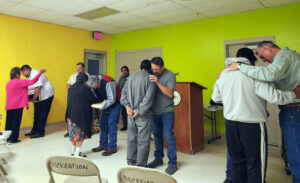
RALEIGH, N.C. (BP) — The U.S. State Department’s designation of Boko Haram and its offshoot Ansaru as terrorists will heighten awareness worldwide of the groups’ atrocities but will require the cooperation of the government in Nigeria to save Christians from terrorism there, a Southern Baptist Nigerian relations expert said.
“It has sent a very strong signal to the organization that it will not be treated with kid gloves if it attacks U.S. and Western interests,” said Adeniyi Ojutiku of Raleigh, N.C., co-founder of Lift Up Now, a Christian-based grassroots organization addressing political, economic and social challenges in his homeland Nigeria.
“In this whole effort, in designating them as foreign terrorists, the expectation is that the Nigerian government will collaborate with the U.S. government,” Ojutiku told Baptist Press.
“But the Nigerian government either lacks the political will to do what is expected of them in that collaboration, or they actually use the [heightened attention on the] Boko Haram as … an opportunity to cover other serious issues of bad governance.”
The State Department in November has designated the two groups as Foreign Terrorist Organizations and Specially Designated Global Terrorists in an effort to counteract the al Qaida-linked groups that have killed and displaced thousands of Christians in sectarian violence. The groups are blamed for 14,000 deaths since 1999, according to the U.S. Commission on International Religious Freedom. Most victims have been Christians.
“In the past two years, Boko Haram has become the primary perpetrator of religiously related violence and gross religious freedom violations in Nigeria,” USCIRF said in its 2013 official factsheet on Boko Haram’s violence in Nigeria. “Boko Haram’s targets include churches, individual Christians, Muslim critics, and persons engaged in behavior deemed ‘un-Islamic,’ as well as northern elders, schools, police stations, government buildings, newspapers and banks.”
The new designations will give the U.S. government authority to fight Boko Haram by freezing any assets the group may have in the United States, denying the groups access to the U.S. financial system, prohibiting persons from knowingly providing material support to the groups, and assisting law enforcement in efforts to pursue the groups and investigate and prosecute individuals associated with the terrorists, Ojutiku said.
“But I don’t think it will do much if … the Nigerian government is not standing up and doing its own part,” Ojutiku said. “There are some aspects that the Nigerian government must do in pulling its own weight.”
The Nigerian government, Ojutiku said, must strengthen its democratic institutions, advance economic reform, control corruption, professionalize its security forces, effectively counter the threat of terrorism and respect the human rights of all its citizens.
Ojutiku, a member of Providence Baptist Church in Raleigh, N.C., requested prayer for the safety of Christians in Nigeria.
“We know that Christians must pray,” he said. “We know that the weapons of our warfare are not carnal, but they are mighty in terms of pulling down strongholds. This is a stronghold and we must draw strength through Christ.”
Boko Haram has already responded to the designations by restrategizing and restructuring to avoid government detection, said Ojutiku, who has about 2,000 Lift Up Now supporters in Nigeria who keep him abreast of the group’s activities.
“The organizations keep evolving … in terms of their goals and their strategy, which makes it a little difficult to sequester them and to deal with them,” Ojutiku said. “Depending on the situation, they associate with people who have some common interests in destabilizing the government and in maintaining chaos, because it’s in the midst of this type of chaos that they are able to operate more effectively. That’s how they operate.”
On the same day the State Department announced the designations, Boko Haram abducted a French priest in Cameroon who was caring for about 10,000 Nigerian Christian refugees fleeing terrorism, Morning Star News reported.
Boko Haram appears to have limited their assault against foreign interests, Ojutiku said, making them less visible to the U.S. government.
“They are not doing that as much as they used to,” Ojutiku said, “because now they see that there’s a global focus on their activities, so their activities are more local.
“They have become more dangerous locally in that regard,” he said. “So there are some people who speculate that [Boko Haram] actually might be in cooperation with oil pirates who are doing oil bunkering in Nigeria so that they have an indirect access to funds.”
According to USCIRF, Boko Haram’s religiously motivated violence since January 2012 has resulted in more than 650 deaths. Included are attacks against 50 churches, killing at least 366 people; 31 attacks on Christians or those perceived to be Christians, killing at least 166; 23 targeted attacks on clerics or senior Islamic figures deemed sympathetic to Christianity, killing at least 60; and 20 attacks on “un-Islamic” institutions or those engaged in activity deemed “un-Islamic,” killing at least 74.
–30–
Diana Chandler is Baptist Press’ staff writer. Get Baptist Press headlines and breaking news on Twitter (@BaptistPress), Facebook (Facebook.com/BaptistPress) and in your email (baptistpress.com/SubscribeBP.asp).
















